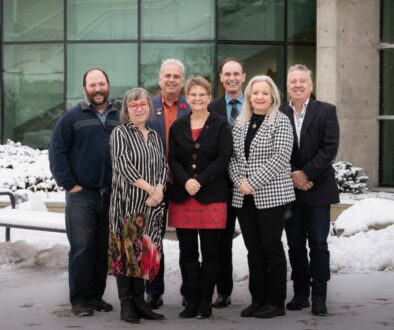Salmon Arm – smart city
Smart city: “refers to environments where digital technologies are used to enhance the quality and efficiency of municipal services. A ‘smart’ city collects and analyses data interactions with, and usage of, public infrastructure in order to improve service delivery and user experience. This data is collected through connected sensors and individual devices which are part of centralized networks that manage service delivery. Smart cities can be scalable according to the needs and intentions of the community. Key factors that shape ‘smartness’ include the quantity and quality of data collected, the degree of interaction of different infrastructure networks, and how the data is used to inform decisions by infrastructure owners and operators.” Definition by Canadian Security Intelligence Service{ CSIS}.

Photo source: depositphotos.com
What kind of data is collected and how? According to CSIS we have to consider these smart city applications: smart utilities, smart homes, autonomous vehicles, smart hospitals, smart commerce, including smart public transportation. To provide one example, smart city technologies used to manage traffic or transportation might collect data that provide a picture of individuals’ movements in a city, and other related data. This personal information could be collected from sensors, such as audio and video recording devices or vehicle license plate readers, or from personal mobile devices.
Smart cities are closely connected with 5G wireless technology, that nowadays covers over 50 cities in British Columbia, including Salmon Arm. Back in 2020, Salmon Arm was among the first 25 cities with 5G technology in our province. Telecommunication giant Rogers proposed to build 200 feet 5G cell tower in town in 2013 at 2391 20th AVE SE. This project and location were later supported by the City council, especially by Alan Harrison, who back in days as a councilor said:” “Probably within the city, it would be hard to find a better location than this one,” He continued: “And cell phones now are becoming an integral part of people’s lives, so they expect and want them to operate well, and of course data, amounts of data are increasing. So I think the location is as rural as you can get inside the city and serving the purpose the company needs.”
Because of 5G tower location and potential negative health effects, Salmon Arm concerned activists blocked the road to the tower location to deny access for work crew to get on the work side. Resident Jean Olsen said:” “We are doing this because we do not believe people are informed about the hazards of these towers and the frequencies and electromagnetic radiation they emit. I’m concerned about the effects on my grandchildren and all the other little people who go to school and live near here and do not have a voice.”
Back in 2019 cities around the world banned or postponed to the building of 5G wireless towers because of health reasons. One of the biggest opponents of this new technology was Switzerland, where concerned residents, doctors, and scientist supported with thousands of protestors forced officials to halt roll-out of 5G network and created a moratorium until March 2022. People worldwide are protesting against this network, and cases, where activists destroyed 5G towers are increasing. More about 5G health hazards and 5G coverage areas in British Columbia on the link below.
Digital ID, cashless society, and cryptocurrency are other elements of smart cities. More about digital ID here: https://www.freeshuswap.com/post/electronic-id-in-canada. All are parts of the plan of the Fourth Industrial Revolution and Great reset, or Agenda 2030. Even so called “ pandemic” is part of the plan as prime minister Trudeau said: “ Pandemic has provided opportunity for reset. This is our chance to accelerate pre- pandemic efforts to re-imagine economic systems, that actually address global challenges like extreme poverty, inequality and climate change.”
Canadian Security Intelligence Service{ CSIS} has concerns about national security because of smart cities. According to CSIS: “Smart cities represent the next generation of critical infrastructure, underpinning nearly all aspects of daily life. This integrated centrality means that smart cities will be attractive targets of hostile state actors and criminals for espionage and sabotage/disruption. Smart cities will collect and operate by processing huge volumes of personal and corporate data produced through interactions with, and usage of, smart infrastructure. This data can provide valuable insights for threat actors, including profiles and patterns of life of Canadians. In the hands of a threat actor, this data can be exploited to enable activities that compromise the safety and security of Canadians (e.g.espionage, foreign interference) and Canadian critical infrastructure. Connecting different critical infrastructure systems via telecommunications networks increases both the ‘attack surface’ and the potential scale of impact (i.e. access to or disruption of one infrastructure systems could have spillover effects on other systems).”
CSIS warning is ignored by the Liberal minority government and pushes the agenda forward. Trudeau government is not listening to safety and health concerns of Canadian experts and activists. This government is not working for Canadians, as it proved so many times before. We should prefer live in a city of full smart people than in smart cities.
DB



